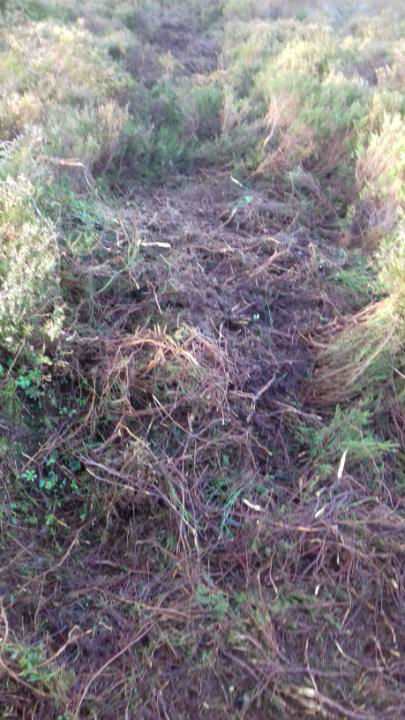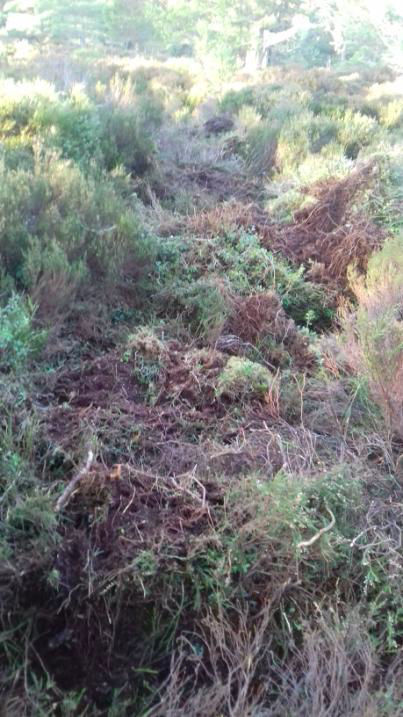SNIPPETS
Rob Mackay
- Reindeer Research project
- The research programme is investigating the ecological role reindeer play
in the Cairngorms, focussing on their movements, behaviour and diet, as well
as investigating what attitudes and values people hold about the reindeer.
This research is being led by Inverness College UHI and in the latest phase
the reindeer are being fitted with GPS camera collars in order to find out
more about the whereabouts and behaviour of reindeer on the hill.
- Scotland's Nature on Red Alert report
- (http://www.scotlink.org/wp/files/documents/Scotlands_Nature_Red_Alert.pdf)
- This report details the nature of climate change and its likely impact on
bio-diversity in Scotland. This is a detailed report that is required and
sobering reading for everybody interested in the Scottish outdoors –
I have just picked out a few issues:
- Potential climate change in Eastern Scotland includes a rise in winter
precipitation of 21 mm and drop in summer precipitation of up to 28 mm.
A temperature increase in winter temperatures of up to 3.1 degrees C and
in summer an increase of up to 4.5 degrees C.
- Mountain habitats will be impacted by climate change; for example snow
cover will be reduced due to a rise in air temperature.
- Many mountain areas would not be climatically suitable for montane plants
such as the dwarf willow
- The rise in temperature would impact on a loss of habitat for birds
such as the snow bunting as the range that suits them would be greatly
reduced. There are currently only 50 breeding pairs of snow bunting in
Scotland
"It is estimated that the current level of commitment will result in
a median warming of 2.6 – 3.1 degrees C by 2100.
In order to limit temperature rise to less than 2 degrees C, governments will
need to do more to cut emissions and do it more quickly. Both globally and
within Scotland, biodiversity is suffering from a wide range of pressures,
including habitat fragmentation, pollution and over-grazing. Already we know
that more than half of Scotland's plant species and over a third of our
butterfly species have declined."
Tamsin Morris, Report Author
- Dalwhinnie Quarry gets the go ahead
- The Cairngorms National Park approved a major extension to the existing
quarry just north of Dalwhinnie. While approval contains a welcome condition
that there must be mitigation by way of a scheme of planting of native tree
species, NEMT objected because we do not consider a large quarry to be in
line with the aims of a National Park.
- Bio-diversity Challenge Fund
- SNH have announced a new fund of £2 million to enhance and protect
nature. This is a 2 year project funded by the Scottish Government and up
to £1 million is available for grants in 2019/2020. SNH is looking for
large scale projects that aim to deliver rapid change on the ground.
https://www.snhpresscentre.com/news/new-flagship-fund-for-nature-launched
- Access issues to Scottish Hydro-power sites
- Davie Black, Access & Conservation Officer has a very interesting article
in 'Scottish Mountaineer' Issue 82 about access issues related
to hydropower sites. His starting question is what sort of access is really
necessary for the maintenance of screens on the hydropower unit? How about
a walk-in from a nearby track? And if a surfaced track is deemed as essential,
what width?
At present guidance suggests 2m to 2.5m is the minimum but Mountaineering
Scotland suggest that a 1.5 m track is adequate. Davie suggests the legacy
of damage to fragile hillsides can be lessened if these basic questions are
asked.
- Mend our Mountains Campaign
- The latest information in the 'Scottish Mountaineer' magazine
states that over £56,000 (93% of the target) has been raised for path
work on Beinn a' Ghlo and almost £29,500 (74% of the target ) for
path work on Ben Vane.
- "Fire Breaks" on Baudy Meg
- While out walking on Baudy Meg, Dave Windle came across the "paths"
as shown in the two accompanying photos. He enquired from the estate and received
the following reply:
"Thanks for your interest. The paths you mention were made by a tractor
and swipe and they have a number of purposes. The main one is that they act
as firebreaks in the event of a forest fire. They wouldn't stop anything
major but they can act to break up fires, slow them down and make them a bit
more manageable. We also hope the paths modify vegetation at least a wee bit.
There is a lot of tree regeneration on the west side of Baudy Meg, but the
theory goes that the vigorous growth of heather may inhibit further tree growth
and that swiping heather may create niches for seeds to fall and geminate.
At the very least we are likely to get a positive blaeberry response and that
will have some benefits for black grouse."


- Cairngorm Capercaillie Project Carrbridge
- A pilot project to save the capercaillie has been established with funding
from the National Lottery and the LEADER programme. The Carrbridge community
have been encouraged to get involved and an event was held in February at
which people were encouraged to suggest ideas and events in the village that
might raise awareness. They heard a number of presentations including one
from the Project Manager Carolyn Robertson. The issue of what capercaillie
related signage people most respond to was raised and discussed.
https://cairngorms.co.uk/carrbridge-steps-capercaillie/
- Independent Deer Working Group
- The group should now be working on finalising their report, which is due
out as you read this. It will undoubtedly have been set back by Simon Pepper's
death.
NEMT Front Page
| Previous Page | Volume Index
Page | Next Page | Journal
Index Page
Please let the webmaster know if there
are problems with viewing these pages or with the links they contain.

